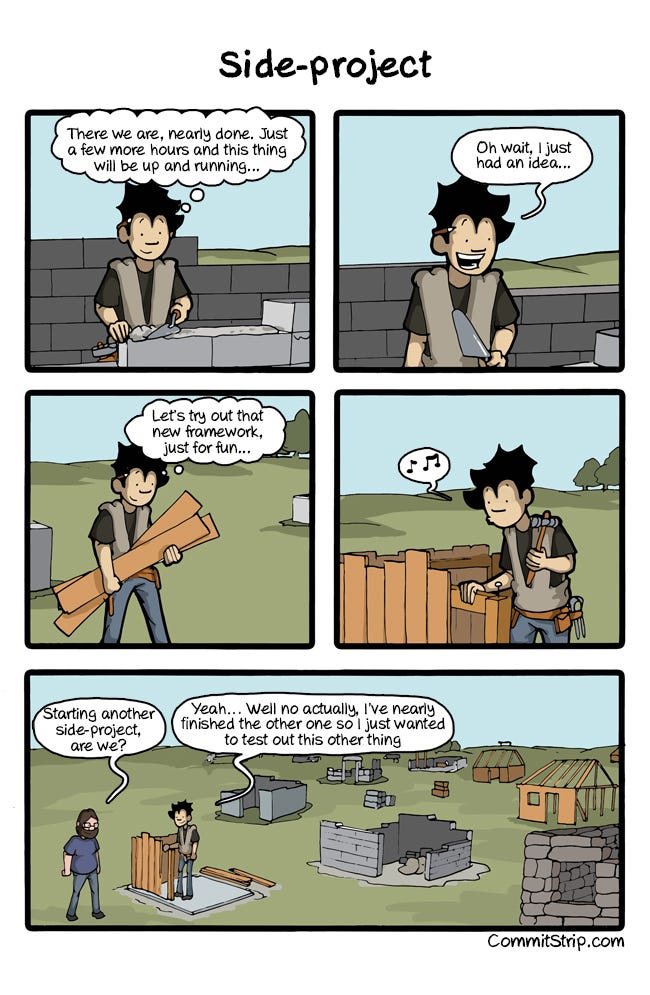Failing Forward: The Importance of Publishing Your Side Projects
Discover the benefits of publishing your side projects, even if they fail. Learn how 'failing forward' can increase your creativity and lead to success.

Developers often take on side projects as a way to explore their passion for programming and learn new technologies outside of their day-to-day jobs. Unfortunately, too many of those never see the lights of the public.
For many developers, programming is a labor of love. - StackOverflow
According to the 2015 StackOverflow survey, an impressive 91.7% of developers reported having active side projects. Unfortunately, the survey does not reveal how many of these projects are published. While it is difficult to determine the exact numbers, likely, only a small percentage of side projects are ever made public.
The average developer spends more than 7 hours per week coding on the side.- StackOverflow
Many developers have continued developing a side project for years. They spend hours creating a product without ever publishing it. Why is that?
The idea of launching a product that is not well-received can be daunting. Despite dreaming about making money with a product, the real potential of launching a product nobody likes is far scarier than developing a product nobody’s heard of.

One of the side projects I started and successfully released is the Chrome extension Web Highlights. I still vividly remember my thoughts when I first made it available in the Chrome Web Store.
- Was I concerned that nobody liked the extension? Yes.
- Was I concerned that users would complain about bugs? Yes.
- Was I excited to publish my first side project? Yes, I was.
So, what happened? Did I launch a product nobody likes?
Let’s put it that way: It could have started better. After one month, I have had four users — Me, my brother, my mum, and a friend. Two months later, I have had eight users — Me, my brother, my mum, and five friends. My brother used to be (and still is) a “bug-hunter,” and my friends helped me test and improve the app.
However, the highlight for me was on March 12th, 2020, when an unknown user signed up for the project. It was a small but significant milestone that brought me joy and renewed my motivation to continue working on the project.
After a year, I was a proud developer of an extension with 124 active users. Meanwhile, there are over 9250 active users. This is still not an overwhelming amount. But much more important to me is that many users love the application as much as I do.

So ask yourself: What could happen? It might be that nobody will notice your product. Or maybe, users will not like your product and will get rid of it again. You might also receive negative reviews. So what?
We can be truly successful only at something we’re willing to fail at. If we’re unwilling to fail, then we’re unwilling to succeed. — Mark Manson
Establishing a mindset where failure is not a bad thing would be best. Actually, failure is necessary for growth. Let me emphasize that by quoting Mark Manson:
If you think about a young child trying to learn to walk, that child will fall down and hurt itself hundreds of times. But at no point does that child ever stop and think, “Oh, I guess walking just isn’t for me. I’m not good at it.” Avoiding failure is something we learn at some later point in life.
Projecting this to side projects means that even if your first project is not a success. Maybe your second, third, or fifteenth is. Never give up and realize that at the end of all of your projects — whether successful or unsuccessful, paid or unpaid, finished or unfinished — you will always win: new experiences, new contacts, and new findings about yourself!
I have not failed. I’ve just found 10,000 ways that won’t work. — Yevgeniy Brikman
Another significant advantage of publishing your side project is showing your work to others. When interviewing for development jobs, it’s not uncommon to be asked if you’ve completed any side projects. Having a GitHub profile is also expected in many cases, and potential employers may ask to see your profile. I can say that having a running Chrome extension with thousands of users caused me amazement during my job interviews.
Final Thoughts
We often start side projects to develop skills and unleash creativity. However, it’s not uncommon for many of these projects to never see the light of day. If you have a side project, don’t be afraid to take the next step and share it with the world. Publishing your project isn’t just about showcasing your work. It’s also the first step to potential success and growth. By embracing the possibility of failure and taking a leap of faith, you open yourself up to new experiences, opportunities, and personal growth. So, don’t delay and publish your project today!
I hope you enjoyed reading this article. I am always happy to answer questions and am open to criticism. Feel free to contact me at any time 😊
Get in touch with me via LinkedIn or follow me on Twitter. Also, check out my PDF & Web Highlighter Chrome extension if you haven’t.
